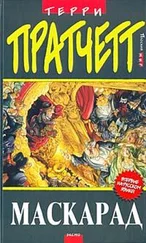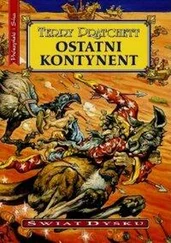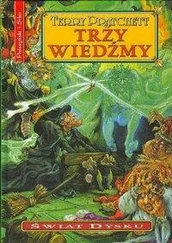Instead, he was now just a step away from the throne, and might soon be monarch of all he surveyed.
Provided that all he surveyed was trees. He sighed.
'Cut what down?' said Lady Felmet, icily.
'Oh, the trees,' said the duke.
'What have trees got to do with it?'
'Well. . . there are such a lot of them,' said the duke, with feeling.
'Don't change the subject!'
'Sorry, my sweet.'
'What I said was, how could you have been so stupid as to let them get away? I told you that servant was far too loyal. You can't trust someone like that.'
'No, my love.'
'You didn't by any chance consider sending someone after them, I suppose?'
'Bentzen, my dear. And a couple of guards.'
'Oh.' The duchess paused. Bentzen, as captain of the duke's personal bodyguard, was as efficient a killer as a psychotic mongoose. He would have been her choice. It annoyed her to be temporarily deprived of a chance to fault her husband, but she rallied quite well.
'He wouldn't have needed to go out at all, if only you'd listened to me. But you never do.'
'Do what, my passion?'
The duke yawned. It had been a long night. There had been a thunderstorm of quite unnecessarily dramatic proportions, and then there had been all that messy business with the knives.
It has already been mentioned that Duke Felmet was one step away from the throne. The step in question was at the top of the flight leading to the Great Hall, down which King Verence had tumbled in the dark only to land, against all the laws of probability, on his own dagger.
It had, however, been declared by his own physician to be a case of natural causes. Bentzen had gone to see the man and explained that falling down a flight of steps with a dagger in your back was a disease caused by unwise opening of the mouth.
In fact it had already been caught by several members of the king's own bodyguard who had been a little bit hard of hearing. There had been a minor epidemic.
The duke shuddered. There were details about last night that were both hazy and horrible.
He tried to reassure himself that all the unpleasantness was over now, and he had a kingdom. It wasn't much of one, apparently being mainly trees, but it was a kingdom and it had a crown.
If only they could find it.
Lancre Castle was built on an outcrop of rock by an architect who had heard about Gormenghast but hadn't got the budget. He'd done his best, though, with a tiny confection of cut-price turrets, bargain basements, buttresses, crenellations, gargoyles, towers, courtyards, keeps and dungeons; in fact, just about everything a castle needs except maybe reasonable foundations and the kind of mortar that doesn't wash away in a light shower.
The castle leaned vertiginously over the racing white water of the Lancre river, which boomed darkly a thousand feet below. Every now and again a few bits fell in.
Small as it was, though, the castle contained a thousand places to hide a crown.
The duchess swept out to find someone else to berate, and left Lord Felmet looking gloomily at the landscape. It started to rain.
It was on this cue that there came a thunderous knocking at the castle door. It seriously disturbed the castle porter, who was playing Cripple Mister Onion with the castle cook and the castle's Fool in the warmth of the kitchen.
He growled and stood up. 'There is a knocking without,' he said.
'Without what?' said the Fool.
'Without the door, idiot.'
The Fool gave him a worried look. 'A knocking without a door?' he said suspiciously. 'This isn't some kind of Zen, is it?'
When the porter had grumbled off in the direction of the gatehouse the cook pushed another farthing into the kitty and looked sharply over his cards at the Fool.
'What's a Zen?' he said.
The Fool's bells tinkled as he sorted through his cards. Without thinking, he said: 'Oh, a sub-sect of the Turnwise Klatch philosophical system of Sumtin, noted for its simple austerity and the offer of personal tranquillity and wholeness achieved through meditation and breathing techniques; an interesting aspect is the asking of apparently nonsensical questions in order to widen the doors of perception.'
'How's that again?' said the cook suspiciously. He was on edge. When he'd taken the breakfast up to the Great Hall he'd kept getting the feeling that something was trying to take the tray out of his hands. And as if that wasn't bad enough, this new duke had sent him back for . . .He shuddered. Oatmeal! And a runny boiled egg! The cook was too old for this sort of thing. He was set in his ways. He was a cook in the real feudal tradition. If it didn't have an apple in its mouth and you couldn't roast it, he didn't want to serve it.
The Fool hesitated with a card in his hand, suppressed his panic and thought quickly.
'I'faith, nuncle,' he squeaked, 'thou't more full of questions than a martlebury is of mizzensails.'
The cook relaxed.
'Well, okay,' he said, not entirely satisfied. The Fool lost the next three hands, just to be on the safe side.
The porter, meanwhile, unfastened the hatch in the wicket gate and peered out.
'Who dost knock without?' he growled.
The soldier, drenched and terrified though he was, hesitated.
'Without? Without what?' he said.
'If you're going to bugger about, you can bloody well stay without all day,' said the porter calmly.
'No! I must see the duke upon the instant!' shouted the guard. 'Witches are abroad!'
The porter was about to come back with, 'Good time of year for it', or 'Wish I was, too', but stopped when he saw the man's face. It wasn't the face of a man who would enter into the spirit of the thing. It was the look of someone who had seen things a decent man shouldn't wot of . . .
'Witches?' said Lord Felmet. 'Witches!' said the duchess.
In the draughty corridors, a voice as faint as the wind in distant keyholes said, with a note of hope, 'Witches!'
The psychically inclined ...
'It's meddling, that's what it is,' said Granny Weatherwax. 'And no good will come of it.'
'It's very romantic,' said Magrat breathily, and heaved a sigh.
'Goochy goo,' said Nanny Ogg.
'Anyway,' said Magrat, 'you killed that horrid man!'
'I never did. I just encouraged . . . things to take their course.' Granny Weatherwax frowned. 'He didn't have no respect. Once people lose their respect, it means trouble.'
'Izzy wizzy wazzy, den.' ,
'That other man brought him out here to save him!' shouted Magrat. 'He wanted us to keep him safe! It's obvious! It's destiny!'
'Oh, obvious,' said Granny. 'I'll grant you it's obvious. Trouble is, just because things are obvious doesn't mean they're true.'
She weighed the crown in her hands. It felt very heavy, in a way that went beyond mere pounds and ounces.
'Yes, but the point is—' Magrat began.
'The point is,' said Granny, 'that people are going to come looking. Serious people. Serious looking. Pull-down-the-walls and burn-off-the-thatch looking. And—'
'Howsa boy, den?'
'—And, Gytha , I'm sure we'll all be a lot happier if you'd stop gurgling like that!' Granny snapped. She could feel her nerves coming on. Her nerves always played up when she was unsure about things. Besides, they had retired to Magrat's cottage, and the decor was getting to her, because Magrat believed in Nature's wisdom and elves and the healing power of colours and the cycle of the seasons and a lot of other things Granny Weatherwax didn't have any truck with.
'You're not after telling me how to look after a child,' snapped Nanny Ogg mildly. 'And me with fifteen of my own?'
'I'm just saying that we ought to think about it,' said Granny.
The other two watched her for some time. 'Well?' said Magrat.
Читать дальше











